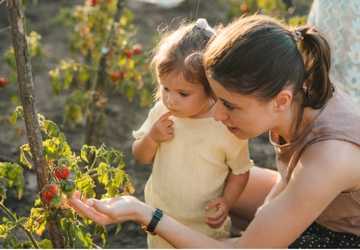Organic Parenting - A Complete Overview
What is organic parenting? This child-rearing philosophy espouses a holistic, naturalistic approach. It advocates for leveraging natural resources, curtailing exposure to artificial agents, and cultivating a profound connection with the natural environment.
Benefits of a Natural Parenting Style

Adopting an organic lifestyle confers numerous substantial benefits that enhance the welfare of both progeny and progenitors:
Optimal health: Prioritizing organic sustenance and curtailing exposure to toxic chemicals reduces susceptibility to ailments and allergic reactions.
Emotional maturation: This parenting ethos fosters transparent communication and robust familial bonds, which are indispensable for children's emotional maturation.
Ecological sensibility: Progeny nurtured within an organic lifestyle are typically more attuned to their ecological impact and the imperative of environmental preservation.
Adopting an Organic Lifestyle
The shift towards organic parenting entails pivotal lifestyle alterations. Here's a systematic blueprint:
1. Nutritional Regimen
Elevate the intake of organic produce to diminish pesticide exposure.
Commit to unadulterated, unprocessed foodstuffs in daily diets.
2. Sustainable Habitation
Employ eco-friendly cleaning agents.
Opt for garments and linens crafted from organic, non-toxic materials.
3. Comprehensive Wellness
Favour natural remedies and preventive healthcare modalities.
Embed practices of mindfulness and human wellness, such as meditation and yoga.
Innovative Methods in Organic Parenting
1. Environmental Instruction
Nature Integration: To cultivate a child's environmental reverence and comprehension, Foster routine family excursions to immerse in nature, such as traversing park trails or exploring botanical sanctuaries.
Preservation Endeavors: Involve children in ecological restoration efforts, such as arboreal cultivation or local sanitation initiatives, to nurture their responsibility and guardianship of the planet.
2. Conscious Consumption
Ethical Procurement: Instruct children on the repercussions of their consumption decisions by opting for ethically obtained goods that are devoid of exploitative practices.
Reduction of Waste: Establish household routines that curtail waste, emphasizing organic decomposition and systematic recycling to exemplify eco-conscious living.
3. Diverse Educational Frameworks
Experiential Outdoor Learning: Enroll in schools or programs that offer experiential learning in natural environments, which complements organic parenting principles.
Integrated Learning Systems: Delve into educational methods that merge physical, emotional, and spiritual development, like Montessori or Waldorf, which resonate with organic parenting philosophies.
Enhancing Family Wellness Through Organic Practices
1. Holistic Health Interventions
Herbal Applications: Employ herbal concoctions for minor health issues, utilizing plants such as chamomile for calming effects or echinacea for immune enhancement.
Dietary Prevention: Emphasize a diet laden with organic produce to bolster the body's defences and foster sustained wellness.
2. Nature-Infused Physical Activities
Outdoor Fitness: Embrace outdoor exercise routines, like park yoga or trail cycling, to boost physical health while intimately connecting with nature.
Rugged Sports: Introduce children to robust sports such as rock climbing or river kayaking, which will promote robust health and a passion for the outdoors.
Sustainable Family Living Strategies

1. Eco-Optimized Home Innovations
Efficient Energy Use: Retrofit your dwelling with energy-saving solutions like photovoltaic systems or thermal-efficient fenestrations to lessen the ecological impact and instil energy consciousness in youngsters.
Renewable Resources: Favor renewable and harmless materials for home renovations, like bamboo surfaces or emissions-reducing paints.
2. Community Involvement and Educational Outreach
Organic Community Agriculture: Engage in or initiate a communal cultivation project that supplies fresh, organic harvests, serving as an educational tool for youngsters about food origins.
Intercultural Interactions: Participate in community festivals or global cultural events to expose children to worldwide traditions and underscore the importance of cultural variety in ecological sustainability.
Advanced Child Development Strategies in Organic Parenting
1. Emotional and Environmental Awareness
Mindfulness Initiation: Introduce practices focused on mindfulness from an early age to aid in stress management and heighten environmental and emotional perception.
Compassion Cultivation: Encourage empathetic behaviours by involving children in caring for domestic animals or participating in volunteer activities at animal shelters or elder care facilities.
2. Naturalistic Artistic Development
Eco-Artistic Expression: Promote using natural elements for creative projects, such as constructing artworks from leaves, branches, and pebbles, which are aesthetically pleasing and environmentally considerate.
Eco-Sonic Exploration: Investigate music that integrates sounds from nature or instruments made from organic materials, enhancing a child's creative and auditory faculties.
Advanced Technological Integration in Organic Parenting
Digital Minimization
Reduction of Screen Time: Enact protocols for diminishing electronic display exposure, fostering enriched direct engagement with the natural environment.
Technology Proscribed Zones: Designate specific sectors within the dwelling where digital devices are proscribed, thus promoting intensified interpersonal exchanges and imaginative play.
High-Caliber Educational Technology
Selective Application Usage: Discriminately employ educational applications that advance understanding of natural phenomena, ecological sustainability, or mental awareness.
Virtual Experiential Learning: Use online platforms to explore varied ecosystems and global cultures, thereby augmenting the organic living ethos.
Economic Considerations in Organic Parenting
Despite its advantages, adopting an organic lifestyle can encounter formidable challenges:
Prudent Financial Stewardship for Organic Products
Strategic Fiscal Management: The elevated cost associated with organic commodities, a reflection of their more labour-intensive production processes, necessitates meticulous financial planning. Families can mitigate these expenses by judiciously allocating funds, giving precedence to indispensable items, and progressively incorporating more organic products into their domestic routine.
Economical Acquisition Strategies
Leveraging Local and Cooperative Resources: Exploit local farmers' markets, enrol in community-supported agriculture (CSA) programs, and engage with cooperative buying groups to secure organic items at reduced rates. Strategic bulk acquisitions and opting for seasonal produce are productive methods to curtail expenditure.
Overcoming Resource Scarcity
Cultivation of Local Alliances
Network Development in Resource-Deficient Areas: In locales where organic resources are sporadic, establishing networks with other families committed to organic principles can facilitate resource sharing and access. Initiating or integrating into a local consortium dedicated to sustainable living can bolster support and enhance the availability of organic provisions.
Utilization of Digital Marketplaces
Strategic Online Procurement: Capitalize on digital platforms to acquire elusive organic products locally. Numerous e-commerce portals offer a wide range of organic items, from nourishment to attire, frequently with options for bulk purchases, thus expanding access and convenience.
Conclusion
Embracing organic parenting and adopting an organic lifestyle endows families with substantial health and emotional advantages, fostering a sustainable and nurturing milieu. While the path may present hurdles, the resultant enhancement in child development and ecological stewardship is profound and lasting.
Through this philosophy, families can instil in their children a profound reverence for nature and an unwavering commitment to its preservation, ensuring a legacy of environmental stewardship and holistic well-being.





